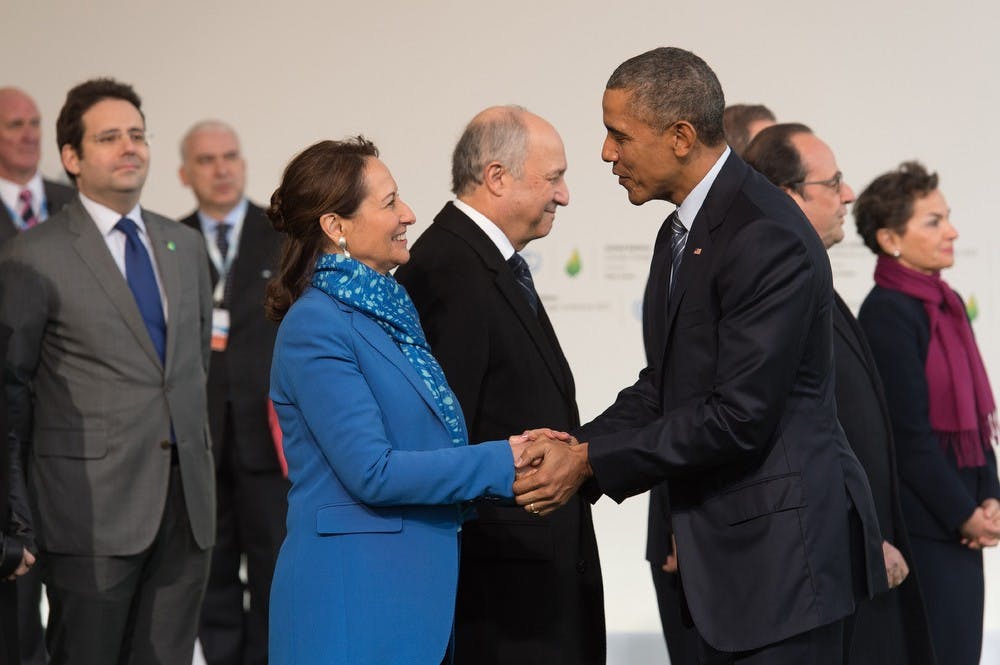Yesterday marked the beginning of the 21st session of the Conference of the Parties on Climate Change, or COP21. President Barack Obama, Chinese President Xi Jinping and Russian President Vladimir Putin will gather with leaders from all 195 countries that make up the United Nations Framework on climate change. In an attempt to limit the current rate of global warming, the goal of the conference is to create a legally binding, universal agreement on climate and in particular agree on a specific plan of action for each country.
There are many diverse opinions on how to solve the current ecological problem. Proposals can almost always be thought of as advocating for technological advancement, carbon emission limitation or a combination of both. Many pundits believe that we will innovate our way out of our issues with green tech. On the other hand, there are experts who stress curbing our current carbon emissions, as we cannot stand to release greenhouse gases at the current rate, so long as there is no solution in sight. Most authorities and advocacy groups probably fall somewhere in-between these two ideals.
I agree that climate change is a tangible problem facing society today and that resolving the issue will require efforts on behalf of both governments and their constituents alike. In addition to limiting our consumption and both utilizing and creating cleaner sources of energy, an overhaul in the public’s perception of nature, the environment and climate change is required if we expect people to support these changes. This is evident because despite the fact that most people are aware of the looming threat of climate change, little is done about it.
The modern understanding and depiction of nature trouble me. The idea that human hubris and industrial advances are leading to the demise of our planet is a notion I agree with, but feel that I cannot fully understand. I spent hours reading about climate change and ecological problems before writing this article, yet the moment I stepped outside and saw an Arizona sunset it became difficult for me to grapple with the idea that any aspect of our environment could be at risk. Every few days, I take the trash from my dorm room to the communal dumpster. I am certainly aware at a conscious level that my trash will be taken to a landfill, but in my immediate experience the trash disappears from my reality.
I am led to believe that the current depiction of nature as something that exists outside of people and society and which we simultaneously rely on for sustenance is problematic. The concept that we are an abstract form constantly manipulating nature and utilizing it from afar fails to realize that our everyday lives are inherently a part of nature and that every action we make is done within it. To quote Timothy Morton in his book "Ecology Without Nature," “Putting something called Nature on a pedestal and admiring it from afar does for the environment what patriarchy does for the figure of Woman. It is a paradoxical act of sadistic admiration”.
It is through the act of putting nature on a pedestal that I fail to realize how my own actions affect our world. Not only am I precluded from understanding my footprint on society in this way, but also I am not able to realize to what effect my actions could be a part of the solution. If we are to innovate our way to a green tech solution or responsibly consume in a way that will resolve climate change, it is going to be necessary to change the way we understand ecology.
Related Links:
Don't forget to worry about climate change
Be American, stop ignoring climate change
Reach the columnist at bjking6@asu.edu or follow @benkingaz on Twitter.
Like The State Press on Facebook and follow @statepress on Twitter.
Editor’s note: The opinions presented in this column are the author’s and do not imply any endorsement from The State Press or its editors.
Want to join the conversation? Send an email to opiniondesk.statepress@gmail.com. Keep letters under 300 words and be sure to include your university affiliation. Anonymity will not be granted.




